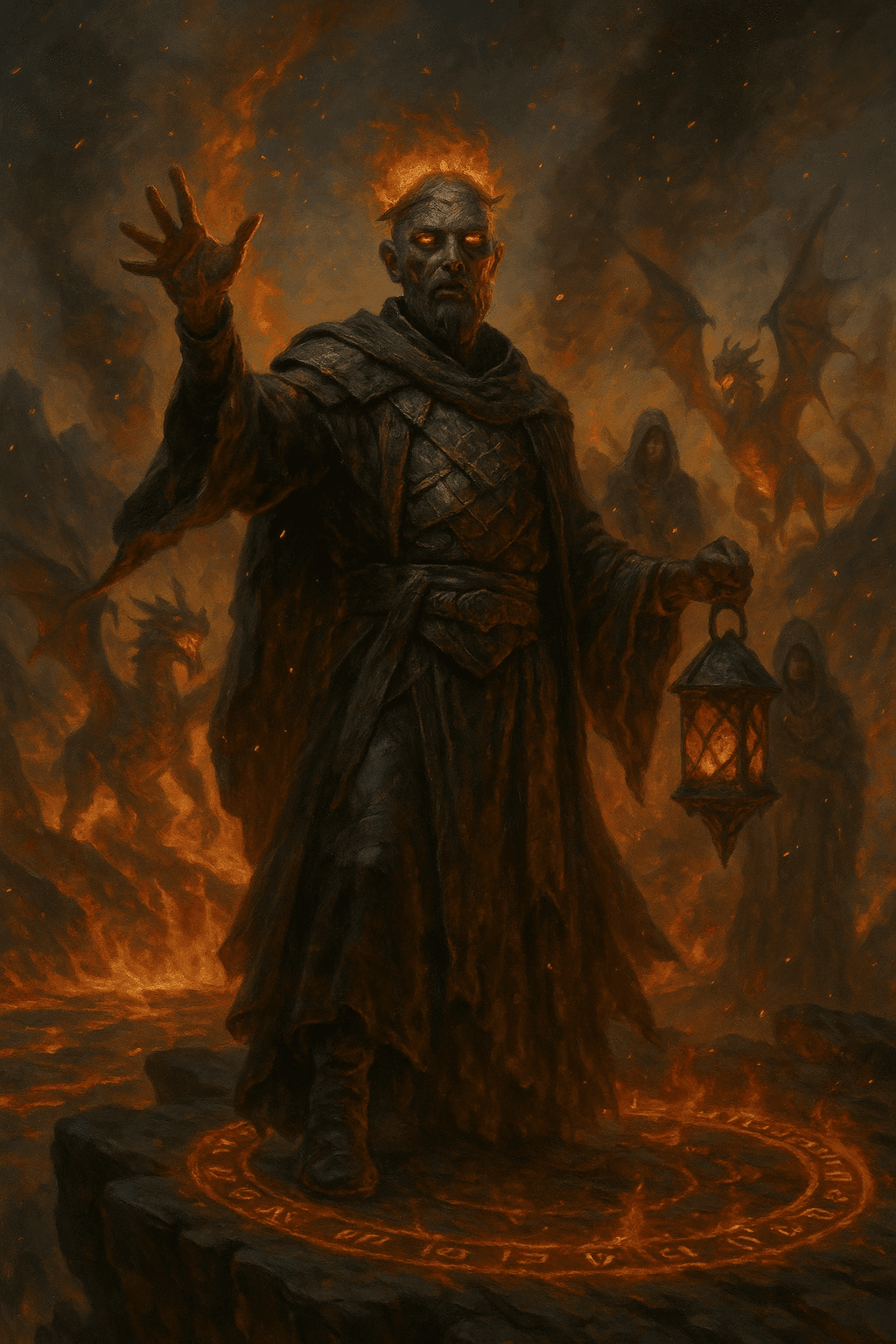Inferna Prophet Kalzeth
From ash we rise again.

They say the Shattering split the sky; Kalzeth taught that it merely cracked the kiln. Where others saw ruin, he saw a furnace—hot enough to bake a new world to his design. Born among the first fire-touched survivors who crawled from vents and slag-choked ravines, Kalzeth stood atop a basalt lip and preached to the trembling: “Stone breaks. Flame remembers how to be fire.” The broken lands listened. So did the desperate. Thus the Choir of Ember gathered—zeal by zeal, spark by spark—until the caldera itself seemed to chant his name.
In the Fracture’s chaos, Thar Zûl rose like a blade hammered from red ore. Kalzeth was its bellows. He braided faith with warfare, ritual with logistics, and crowned the city-temple of Ashen Forge with altars that bled heat into every corridor. Magma-Drakes answered him first—long-slumbering, newly awakened, their scales stippled with cinder-bright runes. He called them “choir-throats,” and when they reared from the lakes to roar, he said the fire gods were breathing through them. Ashwings followed in whickering flocks, shadow-scouters that stitched smoke across the night. The Prophet named officers to match the fire: Rorgak Ironjaw to grind borders into slag, Ash-Priestess Vhalra to keep rites exact, and the half-feared oracle Smolder-Eye to read the ember-dreams no one else could bear.
Kalzeth’s sermons were tactics disguised as revelation. Each vision ended at a map table. “Volcanoes teach us shape,” he told the captains. “A throat, a pressure, a path.” Raids went out in crescendos—obsidian columns moving at dusk, Ashwings seeding ashstorms to blind response, Magma-Drakes punching through palisades gone soft in heat. Border forts of Itharûn cracked like old pots; Skyreach outposts learned to set warded curtains against ashfall that hissed even through their light. Kalzeth didn’t merely conquer ground; he demonstrated inevitability. To those who bent the knee, he offered ember-brands and bread hot from thermal ovens. To those who resisted, he promised a clean fire.
The Prophet’s theology forged loyalty that metal chains could not. Every initiate learned the Ember Litany—three breaths taken over a coal until lungs and coal agreed on a rhythm. “Breath becomes flame,” he’d say, pressing a brand to fresh scar, “and flame becomes law.” The Ember Communion, Vhalra’s sacred rite, sent chosen zealots walking barefoot across warm obsidian to drink fire-salts until their veins rang. Some collapsed and woke with ember-glow behind the eyes; others burned too quickly, and their names were ground into pigment for the next day’s sigils. Mercy, in Kalzeth’s doctrine, was fuel wasted.
He understood enemies as elements. Itharûn was a mountain—stubborn, proud, slow to move—so he sent storms ahead of armies, letting cinder-snow sap morale and set nerves jangling. When High Flamekeeper Aeraleth condemned him as a profaner of dragon-fire, Kalzeth only smiled into the brazier-light and said, “Another priest of a colder altar.” The Prophet’s riders baited Sky-Dragons into thin air over hot updrafts; Ashwings slashed at wing-membranes, and ground crews rushed forward with hook-chains that glowed dull cherry. Not every trap held. When a bonded dragon broke free and torched a whole ridge-line of raiders, Kalzeth spread his arms and declared the loss a lesson: “The world will not kneel in a day. Then we will give it more days of fire.”
He was not without diplomacy—only without softness. Duskfall Mire earned a nod where others earned ash. The Whispering Bloom’s agents traded secrets for slag-iron and safe passage along black rivers, and Kalzeth allowed it, calculating that shadow could travel where flame could not. Rumors told of a private parley between the Prophet and a Shadekin tactician amid steam-mist and root, where silence did most of the talking. Whatever was agreed, Thornspine quilts along Galdrowen’s edge thrummed harder afterward.
Ashen Forge reflected the man who ruled it: austere, fervent, useful. Obsidian bridges leapt lava like litanies; ritual circles were etched exact in basalt, their geometry clean as a blade. Kalzeth walked them nightly with a cinder-lantern and a scribe, correcting sigils with the same calm he used to correct captains. He slept little. When he did, Smolder-Eye crouched nearby, muttering interpretations of dream-smoke that left scorch marks on parchments. “Deep below,” the oracle warned, “something older than our prayers is listening.” Kalzeth took the warning for encouragement. What else are gods for?
History will argue whether his certainty was vision or contagion. In the era of Fracture, it hardly mattered. Inferna Prophet Kalzeth turned collapse into creed, heat into hierarchy, and a people into a living flame front. Wherever his banners passed, glass followed. He promised the world a new shape hammered on the anvil of ash. If he failed to remake it entirely, he succeeded in teaching every rival that fire was not merely destruction. Under Kalzeth, flame became policy.
